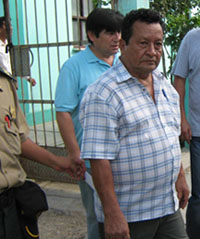New York, January 14, 2010—The editor of a Peruvian weekly newspaper in the Amazonian city of Bagua, Utcubamba province, was sentenced on Tuesday to one year in jail on defamation charges, according to local news reports. The Committee to Protect Journalists called today for his immediate release.
Alejandro Carrascal Carrasco, at right, editor of the Bagua-based weekly Nor Oriente, was convicted of charges that stemmed from a series of articles he wrote in 2005 alleging corruption in a local public educational institute, the journalist’s lawyer, Juan José Quispe, told CPJ. Victor Feria, former director of the institution, filed the defamation lawsuit, the local press said.
The journalist was arrested on Monday by members of the National Police and held overnight pending Tuesday’s verdict, the Peruvian press said. Suffering from high blood pressure, Carrascal fainted before judge Miranda read the sentence, according to the local press group Instituto Prensa y Sociedad (IPYS).
The journalist was taken to a local hospital, and later transferred to San Humberto penitentiary to serve his sentence, IPYS said. Carrascal has appealed the decision, Quispe told CPJ.
“The decision to imprison Carrascal on defamation charges shows that Peru is out of step with the regional consensus to decriminalize defamation,” said Carlos Lauría, CPJ’s senior Americas program coordinator. “We call for the immediate release of the editor pending an appeal that we hope will overturn the defamation conviction.”
Nor Oriente has harshly criticized Peruvian authorities following violent clashes between security forces and Amazonian Indians fighting against oil and mining projects on their native lands. Dozens were killed in the standoff, including more than 20 police officers, news reports said. Journalists in Bagua told CPJ that they believe Carrascal’s imprisonment is related to the paper’s coverage on the conflict, which favored the indigenous struggle.
There is growing international consensus that journalists should not be jailed for criminal defamation. In November, the Argentine Congress repealed criminal defamation provisions in the penal code. In April 2009, Brazil’s Supreme Federal Tribunal annulled the 1967 Press Law, a measure that imposed harsh penalties for libel and slander.
Laws that criminalize speech are incompatible with the rights established under Article 13 of the American Convention on Human Rights, which Peru has ratified. As the Inter-American Commission on Human Rights stated in 1994: “Considering the consequences of criminal sanctions and the inevitable chilling effect they have on freedom of expression, criminalization of speech can only apply in those exceptional circumstances when there is an obvious and direct threat of lawless violence.”
Despite growing accord among international bodies that civil remedies provide adequate redress for press offenses, outdated criminal defamation laws remain on the books in Peru. CPJ believes that civil, not criminal, law provides the appropriate redress in cases of defamation.
